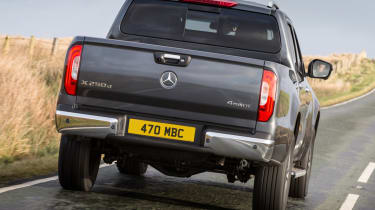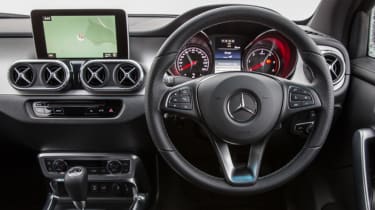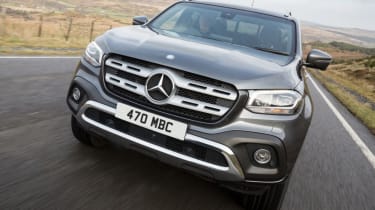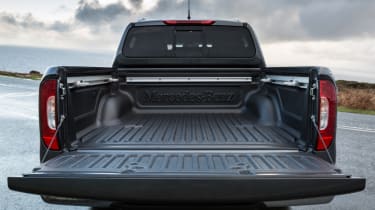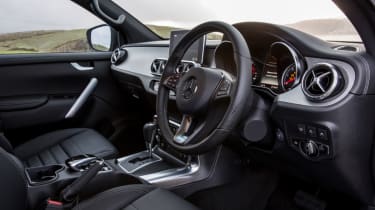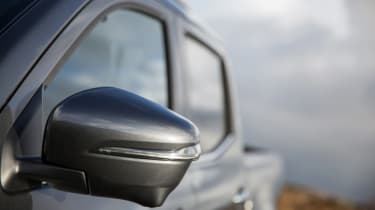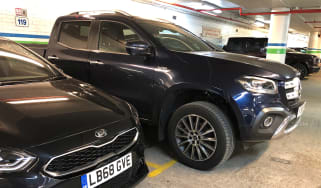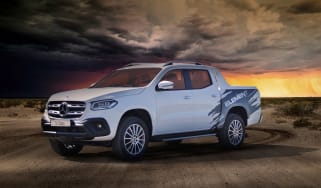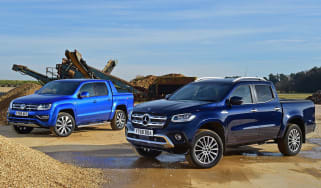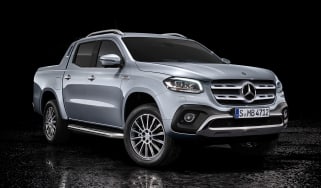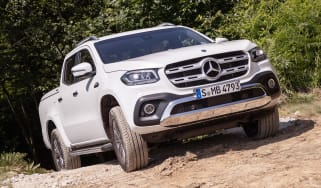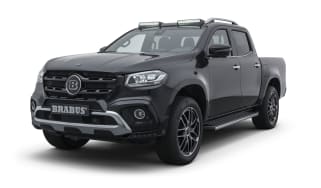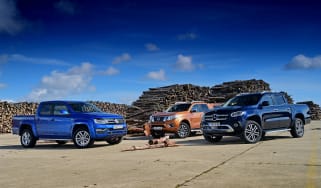Mercedes X-Class pick-up (2018-2020) review
The Mercedes X-Class is a premium pick-up that easily justifies its high price
With pick-up trucks proving popular with buyers, it wasn't going to be long before a premium manufacturer put one on sale. The Mercedes X-Class arrived towards the end of 2017, and it delivers something different for pick-up truck and SUV buyers alike. Those in the know will be aware that the X-Class shares its platform with the Nissan Navara, but to dismiss the X-Class as merely being a Navara with a three-pointed star on the nose and a model-for-model price hike of around £7k just demonstrates that those critics haven't driven one.
The smoother looks outside are one thing, but Mercedes has also added a premium interior inside, especially if you go for one of the higher spec variants. This gives the X-Class an upmarket feel that even puts the company's ageing GLE-Class SUV to shame, while the level of tech and equipment on board is competitive.
Where the X-Class really stands out is with the way it drives. Engineers have gone to great lengths to give the X-Class a better ride quality than any other pick-up trucks on sale, and the suspension has been tuned and upgraded over the Navara to provide ride comfort that puts all other trucks to shame. While the cosmetic changes have moved the X-Class upmarket, it's the way that it drives that really justifies the price premium Mercedes charges over its pick-up truck brethren.
Used - available now

2022 Land Rover
Defender 90
76,500 milesAutomaticDiesel3.0L
Cash £32,850
2024 Land Rover
Discovery
49,609 milesAutomaticDiesel3.0L
Cash £37,950
2025 Land Rover
Defender 110
872 milesAutomaticDiesel3.0L
Cash £73,950
2023 Tesla
Model Y Premium
22,772 milesAutomaticElectric
Cash £24,300There are three X-Class models available: the X 220 d, X 250 d and X 350 d. The 220 d and 250 d use the same 2.3-litre diesel as the Navara, with 161bhp and 187bhp respectively, while the X 220 d comes with a six-speed manual, while the X 250 d is a seven-speed auto. The 350 d comes with a 3.0-litre twin-turbo V6 diesel that packs 254bhp, making it the most powerful pick-up truck on sale (alongside the recently upgraded VW Amarok V6).
Unlike the Navara, just one double cab body style is offered on the X-Class, and there are three trim levels available. These are called Pure, Progressive and Power, but while Pure trim is a basic version with plastic bumpers and steel wheels, it's still more expensive than most other pick-up trucks on sale. You can get the X 220 d and X 250 d in Pure and Progressive trims, while the X 250 d and X 350 d are offered in Power spec. The four-cylinder diesels come with selectable two or four wheel drive, but the V6 model has a permanent 4WD set-up and a seven-speed auto.
Prices for the X-Class range from around £28,250 ex-VAT for the entry-level model to almost £40,000 ex-VAT for the V6. However, the X-Class is classified as a light commercial vehicle (LCV) thanks to its one-tonne payload, so business users don't pay the same rate of Benefit in Kind tax as they would on a similarly specced SUV, making the X-Class an attractive proposition for business users. Road tax is also fixed at £250 a year under LCV rules, so private buyers going for a top-spec V6 model won't suffer the £450 road tax surcharge for the first five years of ownership.
• Mercedes X-Class vs Nissan Navara vs Volkswagen Amarok
A Pure model gets you some pretty basic kit in comparison with the rest of the range. Cloth seats, 17-inch steel wheels, unpainted bumpers and a matt black grille are designed for function over form, while semi-automatic air-conditioning and an infotainment system with DAB, Bluetooth and a 7-inch display screen controlled with a rotary dial are included. The X-Class Progressive adds body-coloured bumpers and alloy wheels, while a rail-based cargo securing system is added to the load bay, an eight-speaker stereo is fitted, as are automatic wipers. Power models get chrome detailing outside with 18” alloys and LED headlamps. The interior is finished in leather with keyless entry and start, climate control and electric front seats are also included.
There’s a good level of standard safety kit on the Mercedes X-Class, but if you want satellite navigation you’ll need to specify it as an option – either as a bolt-on Garmin system or as Mercedes’ own COMAND infotainment set-up that also boosts the screen size to 8.4 inches. On top of this, there’s a range of option packs called Style, Comfort, Parking and Winter, which boost the X-Class in these areas for a fee. Metallic paint is also available, although the Limonite Yellow seen when the X-Class was launched has never been offered to customers.
Really, the X-Class has established itself as a premium model that's a rung above the pick-up truck norm. Its closest rival is the VW Amarok, the only other V6-diesel truck on sale in the UK, but the Amarok can't match the X-Class for quality. Top-spec versions of the Nissan Navara, Ford Ranger and Mitsubishi L200 are all cheaper and better equipped than the X-Class, too, but they still feel agricultural in comparison. In some ways the X-Class is a closer match to SUVs such as the Mercedes GLC or GLE, especially if you add a tonneau cover that converts the pick-up bed into a boot.
Increasingly, the tax benefits of double-cab trucks mean most are bought by fleet customers and small businesses as tax-efficient company cars or lifestyle vehicles. This does take the edge off the X-Class prices while making its quality, composure and desirability stand out. If you take the plunge, you won't be disappointed, and you're definitely getting much more for your cash than simply a Navara with a nose job.
MPG, CO2 and Running Costs
The upfront price of a Mercedes-Benz X-Class is on the high side compared to the other options UK pick-up buyers will be faced with, but the likes of the Nissan Navara, Mitsubishi L200, Toyota Hilux, Ford Ranger and, even, the Volkswagen Amarok won’t protect your investment as well. Expect the strong residual values that usually accompany the three-pointed star across the passenger car market.
Fuel economy is less of a sure thing because despite using the same engines as a Nissan Navara, the X-Class is less economical. It can manage 37.2mpg on the combined cycle in X 220 d form where you’ll get 44.8mpg from the Navara with that 161bhp powerplant. With its automatic gearbox, the X 250 d gets 35.8mpg combined compared to 40.4mpg in the equivalent Navara. This is probably down to the weight added to the X-Class in the form of its extra length, wider track and chassis strengthening. At 2,213kg in entry-level form, its kerbweight is 227kg higher than the Navara’s and 63kg up on the V6-engined VW Amarok.
CO2 emissions are pegged at 200g/km and 207g/km for the X 220 d and X250 d respectively while all models have Selective Catalytic Reduction (SCR) exhaust after-treatment tech to control NOX and particulate emissions. That necessitates a 17-litre Adblue tank in addition to the 73-litre main fuel tank.
The X 350 d V6 diesel is designed for performance over economy. It has permanent 4WD and a seven-speed auto as standard, and has a quoted economy figure of 31.4mpg, so you'll be lucky to manage any more than mid-twenties economy in the real world. Emissions of 236g/km are pretty high, too, although this doesn't have an effect on Benefit in Kind taxation as all versions of the X-Class qualify for LCV tax.
All X-Class models come with a 3-year unlimited mileage warranty and free MobiloVan roadside assistance that covers the whole of the UK and Europe throughout your ownership period.
Load Space and Practicality
The Nissan Navara is one of the biggest pick-ups you can buy in the UK, but the Mercedes X-Class is bigger still. It’s 2,113mm wide including mirrors and a substantial 5,340mm long. That equates to respective increases of 38mm and 40mm over the Nissan with the expansion in length down to an extended rear overhang. Compare those numbers to the Mitsubishi L200, one of the more compact UK trucks, and the X-Class is 105mm wider and 55mm longer.
While its bulk may present issues when parking or threading your way down country lanes, the X-Class compensates with a big and almost square load area. The load space available is 1,587mm long and 1,569mm wide - or 1,215mm wide between the wheelarches. When combined with the 1.14 tonne maximum payload in the X 220d models, it makes for a very capable load carrying truck.
The X-Class will tow a 3,500kg braked trailer (the V6 diesel has the same towing capacity as the four-cylinder versions) and Mercedes offers the usual wide range of load bay accessories to tailor the on-board cargo space to your requirements. There’s also an interesting hatch in the rear window of the cab that can be used to poke longer items through. It’s also electrically operated on higher spec models.
If you need more specialist load-carrying abilities, you can add a tough plastic load bed liner, hard tonneau covers of various types or roof-height hard-top canopies for a fully enclosed luggage space like that of an SUV.
Reliability and Safety
While the standard specifications of the Mercedes X-Class don’t look particularly generous in some respects, they are comprehensive when it comes to safety kit. All models have twin front and thorax airbags plus a driver’s knee airbag and window airbags down the side of the cabin. There’s Active Brake Assist autonomous emergency braking, Hill Start Assist and Land Keeping Assist, too.
All X-Classes have a reversing camera and a traffic sign recognition system, but you’ll need to specify the Parking Package to get the Parktronic parking sensors and the clever 360-degree camera system that gives a bird’s-eye view of the X-Class and its surroundings on the screen. Trailer Stability Assist is also on the options list, as an add-on to the standard ESP stability control system.
It’s still early days for the X-Class but not for the Nissan Navara which it shares many components with. We’d expect any serious reliability issues to have been weeded out by now but ultimately time will tell how the X-Class fares. While the last generation Navara (D50) had a reputation for rust and potential chassis failures because of it, the current Navara was new from the ground up when it launched in 2016, so this issue is unlikely to be raised again, especially if the vehicle is properly maintained.
Security
The X-Class has Mercedes’ anti-theft protection package as standard.
Driving and Performance
Performance is about par for the course in the pick-up truck segment and certainly nothing to write home about. You get 161bhp and 403Nm of torque from the entry-level 2.3-litre 4-cylinder diesel unit or 187bhp and 450Nm from the more powerful version of the engine with the auto box as standard.
All this equates to a 12.9s 0-62mph time and a 105mph top speed, or 11.8s and 109mph in the higher-power option thanks to its twin-stage turbo. That’s not particularly fast and on the road throttle response feels a little sluggish in normal driving. That being said, there’s enough muscle to shift the weighty X-Class around without undue drama and the extra sound-proofing Mercedes has installed means refinement is good.
The X 350 d turns things up with 254bhp and 550Nm of torque, which gives it a 0-62mph time of 7.5 seconds. The V6 also has permanent 4WD and adds a Dynamic Select switch that can boost throttle response and steering weight, or trim everything back to boost economy. It also has steering wheel paddles to change gears manually, although we've found the box works best in auto mode, as it doesn't like being rushed.
Mercedes has taken the chassis it inherited from the Nissan Navara – with its independent multi-link rear axle - strengthened it, widened the track and retuned the suspension with better quality springs and dampers. The result is handling that is highly impressive for the pick-up class. The X-Class deals with the transference of its considerable weight well, not rolling too much in corners or pitching over undulations. It feels composed and inspires confidence with its well weighted steering. Without a load on board, the X-Class doesn’t crash over bumps or potholes, although there's a constant patter through the springs that's amplified as the surface gets worse. But then an SUV on large alloy wheels can suffer from the same issues, so the X-Class really does perform well in this regard.
The X-Class is reasonably easy to manoeuvre for something its size, especially as all models as standard get a reversing camera (but not parking sensors). Visibility is good and the X-Class has a flatter bonnet design than the Navara, so you can see more out of the front. Mercedes offers an electrically-opening rear window, but this limits rear visibility for little benefit in terms of ventilation or extra load carrying.
The seats are firm but comfortable, particularly the 8-way electrically adjustable ones on the Power models, and there’s enough adjustment for taller drivers with plenty of shoulder room – so you don’t feel hemmed-in against the door like you do in a Navara.
Underpinning the four-cylinder X-Class is a selectable 4x4 system with a low range gearbox. The rear-wheel drive, 4x4 and low range 4x4 modes are selected by a rotary switch on the dash. There’s also hill descent control and the optional 360 degree camera that works as well when you’ve avoiding car park bollards as off-road boulders. Mercedes offers an optional locking differential for the rear axle and a 20mm increase in ride height to boost the off-road performance of the X-Class further.
The X 350 d has permanent 4WD with a low-range setting and hill descent control.
Cab and Interior
The interior design of the X-Class is probably the most adventurous we’ve seen on a pick-up. Elements from the latest Mercedes passenger cars are reproduced, including the tablet-like floating display screen at the centre of the dash and the striking aeronautically inspired air vents. You get a set of clear instruments that are easy to read plus column stalks and a steering wheel from the Mercedes car range, which really add a touch of class.
When you first climb inside the X-Class it makes a great first impression, especially the Progressive and Power models which improve the quality of the materials from those in the entry-level Pure. Look a little closer though and there are lower rent plastics further down. There’s no better pick-up interior, but don’t think the X-Class is the equal of Merc’s passenger SUVs on a quality scorecard, although the few pieces of Nissan switchgear that are present (the key and the rotary control for the 4x4 system being the most obvious pieces) are well integrated.
The 7-inch infotainment system, which is controlled by a touchpad and rotary dial between the seats, may take a bit of getting used to. It’s less intuitive than the touchscreens in some rivals and the controller takes up room on the centre console meaning you only get one cup holder. There’s a flip-top storage bin between the seats with USB sockets for phone charging, but with the glovebox stuffed with the manual, the only other significant storage is the door pockets.
For a pick-up, the rear bench is spacious. The seat squabs are relatively high so you don’t have to bunch your knees up too much, and there’s room for adults to get in without too much hardship. Headroom is generous for all occupants too.


